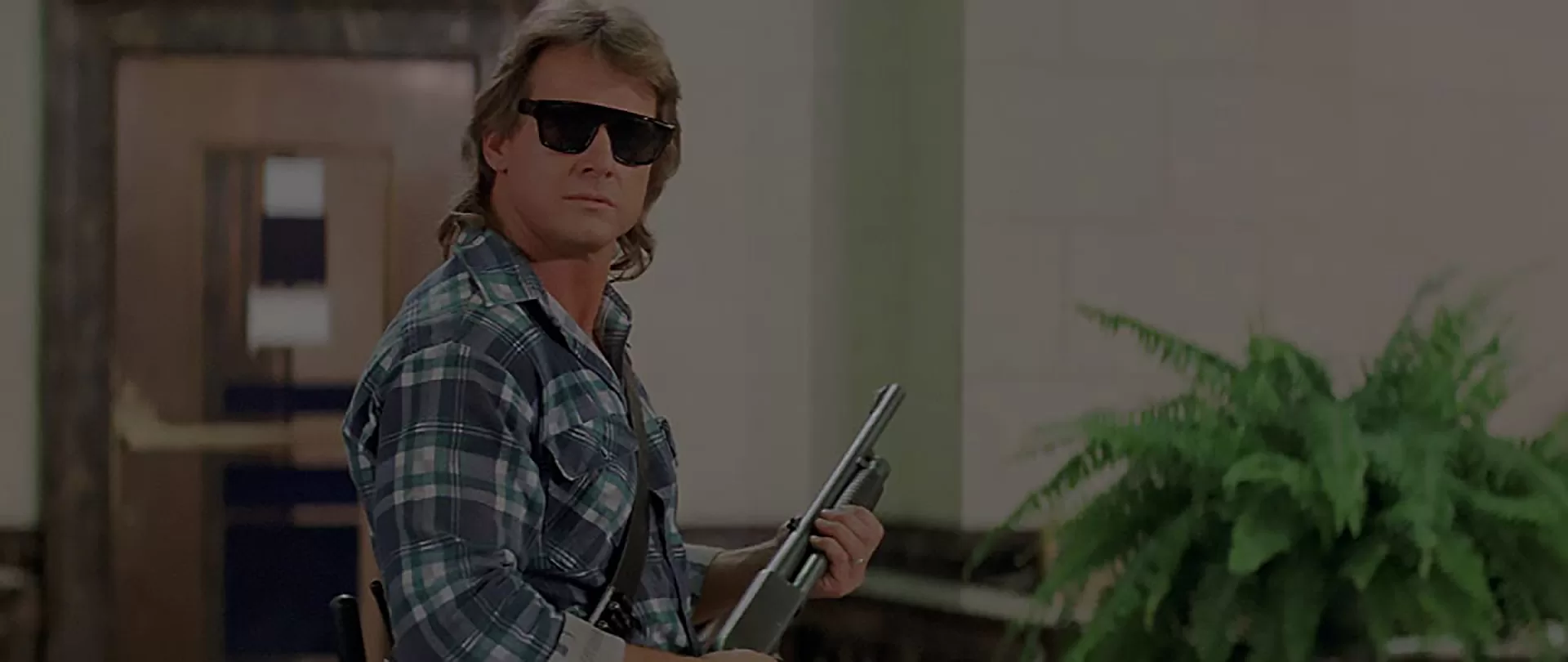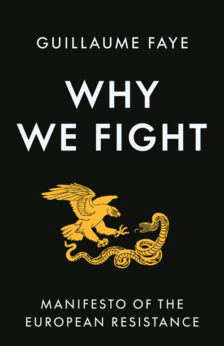Work! Consume! Obey!
What sounds like a description of the social reality in the West in the twenty-first century are the orders given by the aliens in the movie They Live by John Carpenter from 1988. This circumstance is no coincidence, but intentional. As Carpenter explained in an interview, the film was not made with the intention of creating an action or science-fiction film, but rather as a documentary of the United States in the 1980s and especially Ronald Reagan’s ‘(neo-)conservative’ revolution. It was based on the science-fiction short story ‘Eight O’Clock in the Morning’ by Ray Nelson from 1963, which was adapted as a comic book by Bill Wray in 1986. In the comic book, homeless aliens also appear and the boundary between humans and occupiers is much more blurred than in the movie.
Reagan’s Revolution and Neoliberalism as the Main Theme of They Live
During this time, neoliberalism had fully established itself in the West. Western elites had previously made an effort in the Cold War system struggle to tame capitalism in order to keep their own workers loyal to liberalism. However, the social experiment of the ‘Chicago Boys’, who had tried a field experiment under the dictatorship of Pinochet in Chile, resulted in unbridled capitalism. Social benefits were cut, markets were deregulated, state-owned companies were privatised, and millions of people became ‘working poor’, living from hand to mouth. The remnants of society were destroyed by the acceleration of individualism. ‘Bowling alone’ became more and more a reality, which also meant a gradual alignment according to the neoliberal agenda. This revolution of Reagan, which was spread in Europe by Margaret Thatcher (‘There’s no such thing as society’), was also characterised by a (then mainly in academic circles) emergence of political correctness, gender theory, the idea of a ‘green’, ‘climate-neutral’ transformation of society (think of the song ‘California Über Alles’ by the Dead Kennedys), a consumer society that consumes its consumers, and a pathologically universalist anti-racism – all things that continue to this day.
Or, to put it in Carpenter’s words: the Reagan Revolution has never ended. In his eyes, all of this happened because the Right was ‘confused and lost’ while the Left had abandoned its own roots. Apparently, there is no alternative to the existing order anymore. We can imagine the end of the world rather than the end of capitalism, as proclaimed by the Lacan student Slavoj Žižek. Ideologically speaking, it is the result of a transformation of capitalism, beginning with the convergence theory, which was driven forward in particular by the globalist think tank Club of Rome, towards version 2.0 described by Alexander Dugin, which aims to make the wealth of the world accessible only to a small elite while the rest of humanity ‘owns nothing and is happy’ (according to the World Economic Forum).
How Can ‘They Live’ if They Are Dead? On the Visual Representation of Alienation in Capitalism
The film begins with the arrival of the migrant worker Nada in Los Angeles, where he witnesses firsthand the rampant poverty of a homeless settlement (which incidentally is an authentic setting). As his name and lack of background story suggest, he is a blank slate and a projection surface; any one of us could be Nada. With the help of a Christian resistance group, he acquires a pair of sunglasses that allow him to see beyond the illusion of reality before him and recognise the truth: that humans are being ruled by aliens who, on the one hand, appear insect-like and, on the other, resemble undead versions of ourselves. The first contradiction of the film becomes apparent here: how can ‘they live’ if they are dead? It seems that Carpenter wants to draw attention to the human self-abandonment resulting from integration into the neoliberal system by making humans into objects themselves. Humans become estranged from their cultural roots and eventually from their humanity; they become machines in order to function in the system. The dialectic of domination and servitude – Hegelian philosophy in the film.
However, people work together with the aliens, who make them compliant through the comforts of consumer societies. The extraterrestrials in They Live exercise power over people both politically and socioeconomically. When Nada looks through the glasses that allow him to see behind the aliens’ neoliberal ideology, he realises that the newspapers contain encrypted commands that the aliens themselves also read. ‘Obey! Work! Consume! Marry and reproduce!’ is directed not only at people but also at the aliens themselves. The police and media apparatus that upholds the system also consists not only of aliens but also of humans. Immediately one is reminded of Georg Wilhelm Friedrich Hegel’s dialectic of master and slave, noticing that the aliens are most attached to this system as they hold the most prestigious positions, similar to slave masters. The humans, on the other hand, like the slaves, can only win as they have nothing to lose but their chains. However, the human collaborators have much to lose, as can be seen from this revealing quote towards the end of the film:
There ain’t no countries anymore. They’re running the whole show. They own the whole planet. They can do whatever they want. We can have it good for a change. If we help them, they’ll leave us alone to make some money. You can have a taste of the good life. It’s what everybody wants.
While the ‘alien system’ of neoliberalism transcends national borders, and the free market eliminates all boundaries, the people living in this system also become objects and can no longer decide their own fate. They themselves are corrupted, dehumanised, and turned into aliens who are strangers to each other. They trade their humanity and integrity for a share in the system, which promises them ‘a piece of the cake’, material comfort, and prestige in exchange for their soul. This quote not only reveals a critique of globalism and liberalism in the film, but also its class struggle message, which goes far beyond the content of the short story/comic source material.
Don’t Think! Criticism of Political Correctness
Both the humans and the aliens are commanded to ‘No thought’ – this message can be interpreted as a swipe at political correctness, which also wants to forbid us from thinking. Once again, we can recognise a wonderful parable of our society, which functions so smoothly precisely because people do not question it and are no longer able to reflect on their own existence and philosophise. The diabolical effect of political correctness is that it ‘puts our thinking on rails’ by not only forbidding us from saying certain things but declaring them thought crimes and programming us like robots according to the wishes of their users. The character Holly, who appears like an alien/human hybrid due to her eyes, embodies the collaboration of humans with this inhumane system. The struggle between Nada and Frank demonstrates how difficult it is to accept the truth and leave behind the kingdom of lies, as Frank refuses to put on the glasses and face the truth.
The Glimpse behind the Veil of Bourgeois Ideology – a Painful Endeavor
But why does Frank resist? He does so because it is painful to look behind the illusion of bourgeois ideology and recognise the truth. This painful experience, on the one hand, of realising that one has been lied to all their life, and on the other hand, of admitting to oneself that they have too willingly believed these lies, awaits everyone who has seen through the mirages of liberalism. Who wants to admit to having functioned as a tool of unconscious forces? Who wants to admit to having gone along with and maybe even collaborated in a human-hostile system? Who wants to admit to feeling comfortable in it, even though it is morally wrong? And above all: who wants to voluntarily expose themselves to the hardships of resistance, of ‘non-functioning’, when they can simply settle into the lie and ‘function’?
They Live and Our Reality: Those Who Do Not Believe in God Are Capable of Believing in Anything
Each and every one of us has been confronted with this in recent years: be it the lies of our state regarding the coronavirus or with respect to the war in Ukraine. But even if one has recognised the truth, one can reject it and settle into the lie. Humanism, liberalism, and enlightenment have made exactly that possible: those who do not believe in God do not believe in nothing, but are capable of believing in anything. Whether agnosticism, atheism, open Satanism, transhumanism, New Age patchwork religion or the three ideologies of modernity: due to the lack of a relationship with God and metaphysics, man becomes capable of anything in his Promethean delusion.
Christianity as a Response to Nihilism
We can counter the nihilism of our time, which was also denounced by the Orthodox monk Seraphim Rose, with the Christian message of the Bible:
So Jesus said to the Jews who had believed him, “If you abide in my word, you are truly my disciples, and you will know the truth, and the truth will set you free.”
Ronald Reagan and Margaret Thatcher came to power, among other things, by accusing the government and branding any form of authority as something evil. But as John Carpenter rightly pointed out in an interview, there are good and bad governments. While bad government is actually evil (including the absence of government), good government is good and true.
New Right and Fourth Political Theory: Our Glasses to Recognise the Truth
In the face of a system that has become even more inhumane and brutal under the Great Reset than the neoliberal aliens from They Live, we need glasses more urgently than ever before to see through and understand the illusion in which we live. The ideas of the Nouvelle Droite from France and Alexander Dugin’s work The Fourth Political Theory are exactly such glasses that allow us to look behind the masks of the globalists and recognise the truth as something that sets us free and liberates us from bondage, according to the words of Jesus. If we understand the modern age and its roots, understand on what anthropology of man and what philosophy it is based, then we are not only able to deconstruct it, but also capable of formulating an alternative to postmodernity that makes possible the political and spiritual freedom of peoples in a multipolar world.








[…] Seeing Through Neoliberal Ideology with ‘They Live’ Glasses […]